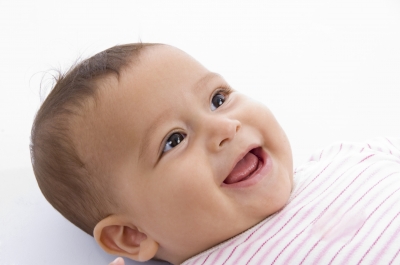 Milestones are guidelines that doctors and health care providers use to determine if your child has a developmental delay or has a potential disability. Remember that all babies develop and grow at different rates. Many parents are guilty of comparing their child to another child that is around the same age and they begin thinking that their child is behind or isn’t doing things that the other baby is doing. Learn what milestones are important and that your baby should be doing by the end of the of their 4 months, 8 months, and 12 months old. Don’t be concerned if your child isn’t doing one milestone in their appropriate age group. However, if your child isn’t doing most of these milestones by the end of the appropriate month. Then you should scheduled an appointment with your child’s doctor or health care provider as soon as possible to discuss your concerns. Your child’s doctor will evaluate your child and determine if your child should been seen by a specialist or be referred to Early Intervention Services.
Milestones are guidelines that doctors and health care providers use to determine if your child has a developmental delay or has a potential disability. Remember that all babies develop and grow at different rates. Many parents are guilty of comparing their child to another child that is around the same age and they begin thinking that their child is behind or isn’t doing things that the other baby is doing. Learn what milestones are important and that your baby should be doing by the end of the of their 4 months, 8 months, and 12 months old. Don’t be concerned if your child isn’t doing one milestone in their appropriate age group. However, if your child isn’t doing most of these milestones by the end of the appropriate month. Then you should scheduled an appointment with your child’s doctor or health care provider as soon as possible to discuss your concerns. Your child’s doctor will evaluate your child and determine if your child should been seen by a specialist or be referred to Early Intervention Services.
Disclosure: This post is for informational purposes only. All opinions reflected in this post are my own and may differ from your own opinions.
By Age 4 Months Your Child Should Be Meeting These Age Appropriate Milestones
A 4 month old child is usually very sociable and loves interacting with objects and people. At this age they love to be talked to and should begin exploring the world around them. However, if they are unable to do more than one of the following milestones, it is important to discuss these missed milestones with your child’s doctor or health care provider.
- Your baby should startle when they hear loud sounds.
- Most babies love attention and will smile at everyone and attract the attention of anyone who is willing to pay attention to them.
- They should begin babbling and cooing as if they are trying to have a conversation.
- Babies love to follow objects with their eyes and they should be able to track an object with their eyes.
- At this age, they being showing an interest in toys. Babies like toys that they can easily grasp and reach for.
- By now your baby should be able to support their own head and hold it up for long periods of time.
